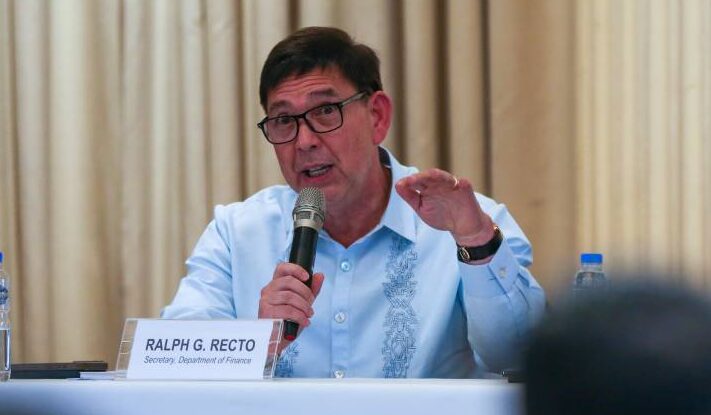Recto: No new taxes until end of Marcos term
There will be no new taxes during the remaining years of the Marcos administration, Finance Secretary Ralph Recto said, adding that the government would instead cut unnecessary spending and improve revenue collection efficiency to boost its fiscal health.
Speaking to reporters on the sidelines of the induction ceremony for new officers of the Economic Journalists Association of the Philippines (Ejap) last week, Recto said the fiscal situation was “not that bad” for the government to slap new taxes.
But the finance chief admitted that improving revenue generation would take time, as the government would have to digitalize its system so it can catch up with the rapid growth of e-commerce, where taxmen are having trouble collecting revenues.
“Let’s try to improve tax collection efficiency … You know, the challenge is we’re moving toward e-commerce. It’s harder to collect in e-commerce,” Recto said.
Last resort
“So I think it is incumbent upon this administration that our last resort is always to increase taxes. Remember, our situation is not that bad. Our debt-to-GDP (gross domestic product) [ratio] is 60 percent, and it will go down,” he added.
Article continues after this advertisementThe Marcos administration plans to borrow a total of P2.46 trillion from creditors at home and abroad in 2024 to help bridge its budget deficit, which is projected to hit P1.4 trillion this year. Based on latest government forecasts, it is only in 2027 that the budget deficit, as a share of the economy, is expected to return to the prepandemic level of 3.2 percent.
Article continues after this advertisementUnder Recto, the Department of Finance is pushing for the passage of its “refined” priority tax measures in Congress, which include the proposed value-added tax (VAT) on digital service providers; the imposition of excise tax on single-use plastics; and Package 4 of the Comprehensive Tax Reform Program.
The finance chief has also thrown his weight behind the proposed rationalization of the mining fiscal regime, and the reform on the Motor Vehicle Users’ Charge. Altogether, these reforms are expected to grow revenues to 16.8 percent of GDP in 2028, from 15.5 percent in 2024.
‘Laudable’
Recto—who pushed back his political aspirations in 2025 when he took the finance portfolio last January—also took the occasion to clarify that his decision to not impose new taxes “has nothing to do” with his plans to run for public office in 2028.
A veteran lawmaker, Recto authored the unpopular Expanded VAT law that supposedly cost him his reelection bid in 2007.
“I might not even run,” he said.
Apart from collection efficiency, the finance chief said he was also looking at reducing nonessential expenditures. The government may also study a possible increase in fees and charges, and boost nontax revenues like dividends from state-run firms and proceeds from sale of government assets. INQ
